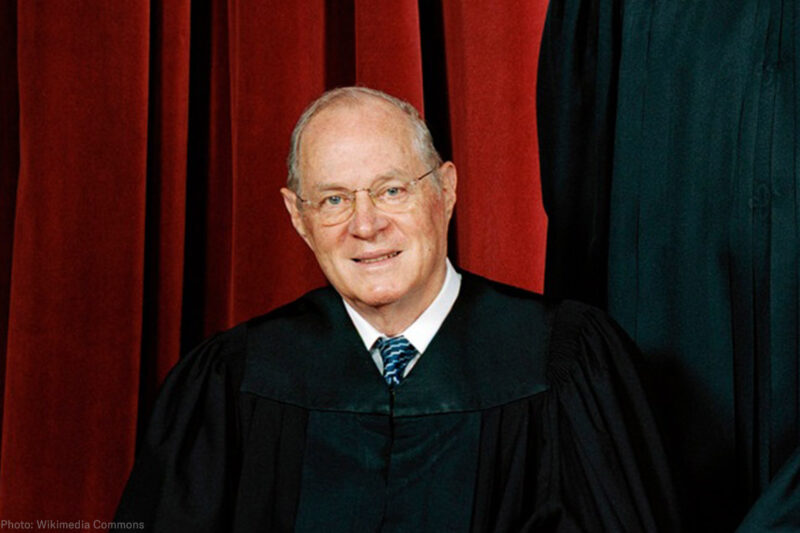
Justice Anthony Kennedy, who announced his retirement on Wednesday after more than 30 years on the Supreme Court, was a Republican appointee who over time became the swing vote on many of the court’s most controversial decisions. Especially after Justice Sandra Day O’Connor retired in 2006, as Kennedy went, so went constitutional law. Sometimes he swung right, other times left. But whichever way he went, more often than not, his was the deciding vote. We’ve called it the Roberts Court, after Chief Justice John Roberts, but it’s been the Kennedy Court in all but name.
Kennedy was a conservative. One study identified him as the 10th most conservative justice to serve in the last century. But he was open to considering arguments on the other side, and not infrequently ruled in favor of liberty for the marginalized. For example, Kennedy wrote all the court’s major cases recognizing the rights of gay men and lesbians, many in 5-4 decisions. In , the court struck down a Colorado referendum barring protection against discrimination on the basis of sexual orientation. In , Kennedy wrote for the court as it struck down a law making same-sex “sodomy” a crime. And perhaps most importantly, he wrote and , both 5-4 decisions extending constitutional protection to the marriage of same-sex couples. In these and other decisions, he saw in anti-LGBT measures a direct affront to the equal dignity of all persons.
As these votes indicate, Kennedy was committed to the idea of an evolving Constitution, not limited to the specific (and historically constrained) ideas of those who adopted it more than two hundred years ago. As he wrote in Obergefell:
The nature of injustice is that we may not always see it in our own times. The generations that wrote and ratified the Bill of Rights and the Fourteenth Amendment did not presume to know the extent of freedom in all of its dimensions, and so they entrusted to future generations a charter protecting the right of all persons to enjoy liberty as we learn its meaning. When new insight reveals discord between the Constitution's central protections and a received legal stricture, a claim to liberty must be addressed.
In keeping with his belief that we may not always recognize injustice, he strived to maintain an open mind. Because, unlike some of his colleagues, he was not committed to a rigid world view, he was persuadable. In preparing cases for argument before the court, many advocates sought to address Kennedy, not only because he was so often the deciding vote but also because he seemed “gettable,” unlike other justices who could be counted on to vote in more predictable ways.
Kennedy showed this openness on two of the most contentious issues of the day. Despite having been a critic of both abortion rights and affirmative action, when cases came before him in which the question was whether to overturn Roe v. Wade or to end affirmative action, he chose not to do so. With Justices O’Connor and David Souter, he played a pivotal role in the preservation of when, in , the court directly addressed whether to overturn Roe. And although Kennedy was an early harsh critic of affirmative action, he voted with the liberal justices to preserve it in , when it seemed most vulnerable to being declared unconstitutional.
Kennedy also was a necessary fifth vote (along with Justice Antonin Scalia) in two cases striking down laws . And he wrote groundbreaking opinions and for juvenile offenders. In the war on terror, Justice Kennedy wrote the majority opinion in , which extended the constitutional right of habeas corpus to Guantanamo detainees.
Still, Kennedy was a strong conservative, and in plenty of opinions he voted with the conservatives to restrict criminal defendants’ rights, to gut the Voting Rights Act, to limit lawsuits against corporations, to strike down portions of the Affordable Care Act, to nullify campaign finance restrictions on corporations, and to uphold states’ rights. This term he voted with the conservatives in all 14 of the court’s 5-4 decisions, including voting to uphold the Muslim ban, to allow states to purge voters for failing to vote, and to end public sector union dues. And perhaps most consequentially, he voted with the Republicans in to stop the recount and ensure George W. Bush’s election.
Nonetheless, he was a moderating force. In Justices Roberts, Clarence Thomas, Samuel Alito, and Neil Gorsuch, there are now four sitting justices who are among the most conservative to have ever served on the court. If President Trump names another right-wing justice, the court will become far more conservative than the country at large. Kennedy’s swing vote allowed the Supreme Court to remain within the mainstream. We should demand that any successor show the same open mind, the same moderating temperament, and the same sensitivity to the equal dignity for all.

